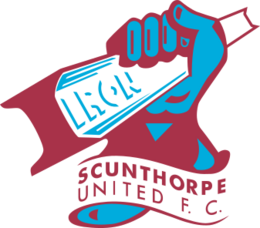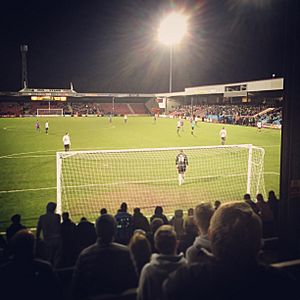Scunthorpe United F.C. facts for kids
 |
|||
| Full name | Scunthorpe United Football Club | ||
|---|---|---|---|
| Nickname(s) | The Iron | ||
| Founded | 1899 | ||
| Ground | Glanford Park | ||
| Capacity | 9,088 | ||
| Chairman | Michelle Harness | ||
| Manager | Andy Butler | ||
| League | League Two | ||
| 2018–19 | League One, 23rd of 24 (relegated) | ||
|
|
|||
Scunthorpe United Football Club is a professional association football team from Scunthorpe, England. They are often called "The Iron" because of the town's history with iron and steel. The team plays in the National League, which is the fifth level of English football.
The club started in 1899 and became a professional team in 1912. They joined the Football League in 1950. Scunthorpe United has had many ups and downs, including playing in the second-highest league (the Second Division) for six seasons. They have also won promotions to higher leagues several times. In 2022, they left the Football League after 72 years. However, in the 2024–25 season, they earned promotion back to the National League.
The team's home colors are claret and blue. They play their games at Glanford Park, which is also known as The Attis Arena. Before that, they played at the Old Show Ground until 1988.
Contents
Club History: The Iron's Journey
Early Years and Joining the Football League (1899–1958)
Scunthorpe United was formed in 1899. In 1910, they joined with another local team, North Lindsey United, and became Scunthorpe & Lindsey United. They started playing in the Midland Football League in 1912.
The team won the Midland League twice, in 1926–27 and 1938–39. After World War II, in 1950, Scunthorpe & Lindsey United finally joined the Football League. This was a big step for the club! In 1958, they dropped "Lindsey" from their name and became simply Scunthorpe United.
Reaching the Second Division (1958–1964)
In 1958, Scunthorpe United won their division and were promoted to the Second Division. This was a very exciting time for the club! They spent six seasons in this higher league. Their best finish was fourth place in the 1961–62 season, which is still their highest league position ever.
However, in 1964, they were relegated back down to the Third Division.
Ups and Downs: A Period of Change (1964–1987)
After being relegated, Scunthorpe United spent several years moving between the Third and Fourth Divisions. In 1970, they had a famous FA Cup win against a top-tier team, Sheffield Wednesday.
During this time, a very talented young player named Kevin Keegan played for Scunthorpe. He later became a huge star for Liverpool and the England national team. The famous cricketer Ian Botham also played for Scunthorpe United from 1980 to 1984, making 14 appearances.
A New Home and Play-off Dreams (1987–1997)
In 1988, Scunthorpe United made history by becoming the first English football club in the modern era to move to a brand-new, purpose-built stadium. This new stadium was called Glanford Park. Their old home was the Old Show Ground.
Moving to Glanford Park brought new hope. The team reached the play-offs several times, trying to get promoted. In 1992, they even made it to Wembley for the Fourth Division play-off final, but they lost in a penalty shootout.
The Brian Laws and Nigel Adkins Era (1997–2010)
In 1997, Brian Laws became the manager. He led the team to promotion to the Second Division in 1999 after winning the play-off final at Wembley.
After Laws left in 2006, the team's physiotherapist, Nigel Adkins, took over as manager. Under Adkins, Scunthorpe United had an amazing season in 2006–07, winning League One and getting promoted to the Championship (the second-highest league).
They were relegated after one season, but in 2009, they won the League One play-off final at Wembley again, beating Millwall 3–2. This sent them back to the Championship for two more seasons.
Leaving the Football League and Recent Years (2011–Present)
After some tough seasons, Scunthorpe United faced relegation multiple times. In 2013, Peter Swann became the new chairman. Under manager Russ Wilcox, the team had an incredible 28-game unbeaten run, which was a Football League record! They earned promotion back to League One in 2014.
However, the club continued to struggle. In April 2022, Scunthorpe United was relegated from League Two, ending their 72-year stay in the Football League. The next year, they were relegated again to the National League North.
In 2023, local businesswoman Michelle Harness took over the club. The team finished second in the National League North in the 2024–25 season and won the play-off final against Chester 2–1, earning promotion back to the National League.
Stadiums: Where The Iron Play
The Old Show Ground
The Old Show Ground was Scunthorpe United's first home, from 1899 to 1988. It was a historic place in the center of Scunthorpe.
In 1987, the club decided to move because the Old Show Ground needed a lot of expensive repairs. The land was sold, and a new location was found. Today, a supermarket stands where the Old Show Ground used to be.
Glanford Park
Glanford Park became the club's new home in 1988. It was built outside the town of Scunthorpe. The stadium has a capacity of 9,088 fans.
Since January 2024, the stadium has been officially known as The Attis Arena due to a sponsorship deal.
Stadium Ownership Changes
In recent years, there were some disagreements about who owned Glanford Park. The previous owner, Peter Swann, had transferred the stadium to another one of his businesses. This caused problems when a new owner, David Hilton, took over the club in 2023.
For a while, it was unclear where the team would play their games. However, in November 2023, the club was able to buy back Glanford Park. This was a big relief for the fans and meant the team could continue playing in their home stadium.
Club Identity: Colors and Mascots
The club's nickname, The Iron, comes from Scunthorpe's strong connection to the iron and steel industry.
Scunthorpe United's main colors are claret and blue. These colors have been used for most of the club's history.
| Period | Kit Sponsor | Shirt Sponsor |
|---|---|---|
| 1975–76 | Admiral | No shirt sponsor |
| 1976–79 | Bukta | |
| 1979–82 | Adidas | |
| 1982–83 | Hobott | |
| 1983–85 | Umbro | Scunthorpe E.Z. |
| 1985–87 | Hobott | No shirt sponsor |
| 1987–89 | Brikenden | |
| 1989–90 | Scoreline | |
| 1990–92 | Ribero | |
| 1992–94 | Alan Ward Sports | |
| 1994–96 | Pleasure Island | |
| 1996–98 | Mizuno | |
| 1998–2000 | Motek | |
| 2000–01 | Super League | |
| 2001–04 | TFG Sports | HL Mercedes-Benz |
| 2004–05 | Carlotti | |
| 2005–07 | Hatfields Jeep | |
| 2007–10 | Rainham Steel | |
| 2010–15 | Nike | |
| 2015–16 | Avec | Prostate Cancer UK |
| 2016–17 | Carbrini Sportswear | British Steel |
| 2017–18 | FBT | |
| 2018–19 | Rainham Steel | |
| 2019–20 | Utilita | |
| 2020–21 | Macron | |
| 2021–22 | Cancer Research UK | |
| 2022–23 | Marshall BMW | |
| 2023–24 | Kelme | HITEK Electronic Materials Limited |
| 2024-25 | ||
| 2025-26 | Meyba |
Team Mascots
Scunthorpe United has two official team mascots: 'Scunny Bunny' and 'Honey Bunny'. They both wear the team's kit and cheer on the players!
Rivalries: Local Derbies
| Club | Last match | Season |
|---|---|---|
| Boston United | D 2–2 | 2023–24 |
| Doncaster Rovers | L 2–3 | 2018–19 |
| Gainsborough Trinity | L 0–1 | 1930–31 |
| Grimsby Town | W 3–0 | 2020–21 |
| Hull City | L 1–5 | 2010–11 |
| Lincoln City | D 1–1 | 2020–21 |
| York City | D 1–1 | 2022–23 |
Scunthorpe United has a few rivalries with other football clubs. The most well-known are the Humber derby and the Lincolnshire derby.
The Humber derby involves teams located near the River Humber, like Scunthorpe, Hull City, and Grimsby Town. The Lincolnshire derby includes several clubs from the county of Lincolnshire, such as Scunthorpe, Lincoln City, Boston United, and Grimsby.
Grimsby Town is usually seen as Scunthorpe's biggest rival. Doncaster Rovers are also considered rivals because they are the closest club geographically.
Players: The Team Squad
Current First-Team Squad
|
|
Famous Former Players
Many talented players have played for Scunthorpe United over the years. Some even played for their national teams while at the club, like Grant McCann for Northern Ireland.
Other famous players who played for Scunthorpe at some point in their careers include:
- Graham Alexander (played for Scotland)
- Jermaine Beckford (played for Jamaica)
- Ray Clemence (famous goalkeeper for Liverpool and England)
- Jack Cork (played for England and Great Britain Olympics team)
- Matt Elliot (played for Scotland)
- Duane Holmes (played for USA)
- Kevin Keegan (a football legend who played for Liverpool and England, and won European Footballer of the Year twice!)
- Ian Botham (a famous England cricket player who also played football for Scunthorpe)
Team Management
Club Records and Achievements
Attendance Records
- Highest attendance at the Old Show Ground: 23,935 fans against Portsmouth in 1954.
- Highest attendance at Glanford Park: 9,086 fans against Chester in 2025.
League Position Records
- Highest league position ever: 4th in the Second Division in 1961–62.
- Lowest league position: 2nd in the National League North in 2023–24 and 2024–25.
Record Game Results
- Biggest win: 8–1 against Luton Town in 1965 and 8–1 against Torquay United in 1995.
- Biggest defeat: 8–0 against Carlisle United in 1952.
Player Transfer Records
- Highest fee paid for a player: £700,000 for Rob Jones.
- Highest fee received for a player: £2.5 million for Billy Sharp.
Honours: Trophies and Promotions
Scunthorpe United has won several titles and promotions throughout its history:
League Titles
- Third Division North / League One (third tier)
- Champions: 1957–58, 2006–07
- Play-off winners: 2009
- Fourth Division / Third Division / League Two (fourth tier)
- Runners-up: 2004–05, 2013–14
- Promoted: 1971–72, 1982–83
- Play-off winners: 1999
- National League North (sixth tier)
- Play-off winners: 2025
- Midland League
- Champions: 1926–27, 1938–39
Cup Competitions
- Football League Trophy
- Runners-up: 2008–09
- Lincolnshire Senior Cup
- Winners (23 times): This is a local cup competition that Scunthorpe United has won many times, most recently in 2024–25.
See also
 In Spanish: Scunthorpe United Football Club para niños
In Spanish: Scunthorpe United Football Club para niños
 | Selma Burke |
 | Pauline Powell Burns |
 | Frederick J. Brown |
 | Robert Blackburn |


